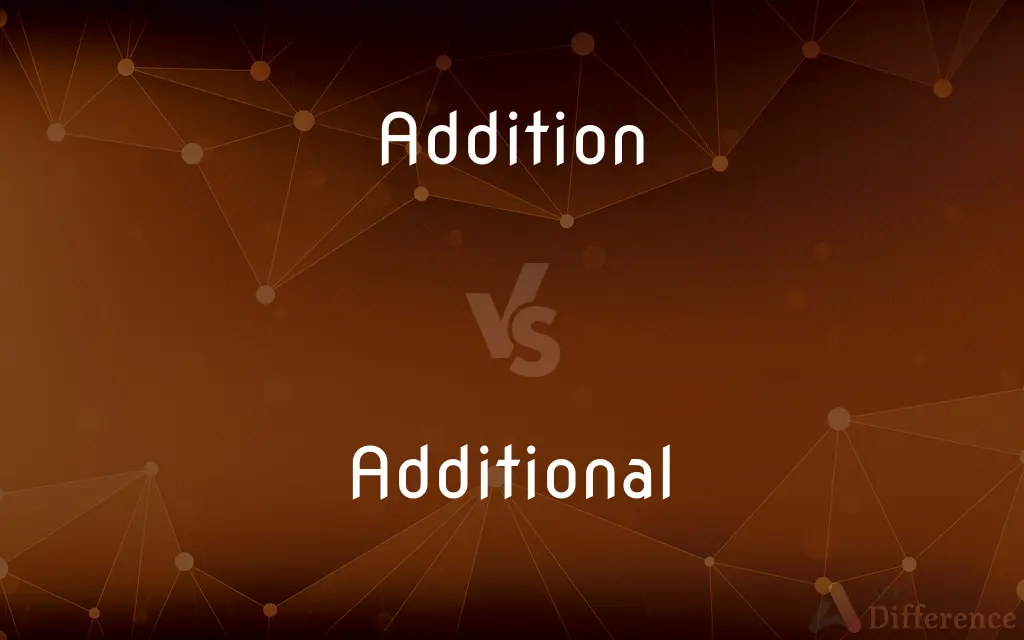Addition vs. Additional — What's the Difference?
By Tayyaba Rehman & Urooj Arif — Updated on April 26, 2024
Addition refers to the mathematical process of combining two or more quantities, while additional is an adjective describing something extra or supplementary.

Difference Between Addition and Additional
Table of Contents
ADVERTISEMENT
Key Differences
Addition is a fundamental mathematical operation that results in the sum of two or more numbers. For example, in the operation 5 + 3, the addition yields 8. Whereas, additional is used to describe an extra quantity or element added to an existing group or total. For instance, if a meeting originally scheduled for one hour gets an additional 30 minutes, the total time becomes one and a half hours.
In educational contexts, addition is taught as one of the four basic operations in arithmetic, crucial for developing quantitative reasoning skills. On the other hand, additional is commonly used in language to modify nouns, indicating an increase or supplement, such as additional resources, additional time, or additional information.
Addition can also be used metaphorically in non-mathematical contexts, such as "an addition to the family," referring to a new family member. Whereas additional cannot be used in the same way; it strictly modifies another noun, enhancing or expanding its meaning, such as "additional member."
In programming and technical fields, addition involves algorithms and functions that execute the adding of numbers or merging data. Conversely, additional in these fields would refer to extra features, components, or resources that are included beyond the standard or originally specified.
The concept of addition is essential in various scientific disciplines, including physics and engineering, where precise calculations are mandatory for experiments and constructions. On the other hand, additional in scientific research refers to supplementary data or experiments that provide further support to the primary findings.
ADVERTISEMENT
Comparison Chart
Part of Speech
Noun (also used as a verb)
Adjective
Usage
Describes the process of adding
Describes something extra
Contexts
Mathematics, everyday calculations
Modifies nouns, everyday language
Example in Sentence
Addition of two numbers gives a sum.
Additional time is required to finish.
Metaphorical Usage
Can be metaphorical
Strictly literal
Compare with Definitions
Addition
A mathematical operation that combines two or more amounts.
The addition of 5 and 2 results in 7.
Additional
Serving as an addition; augmentative.
The additional information clarified the confusing points.
Addition
The action or process of adding something to something else.
The addition of spices improved the dish greatly.
Additional
Not included in the original calculation or consideration.
Additional charges were applied for the late submission.
Addition
An instance of adding something.
The new wing was a recent addition to the school.
Additional
Supplementary or added to what already exists.
Additional seating was arranged for the concert.
Addition
Something or someone newly joined or included.
The latest addition to our team brings extensive experience.
Additional
Extra beyond what is usual or prescribed.
He did additional research to complete his thesis.
Addition
An annex built onto a pre-existing structure.
They built an addition to their home for the extra space.
Additional
Further or more.
Additional efforts are necessary to achieve the target.
Addition
Addition (usually signified by the plus symbol +) is one of the four basic operations of arithmetic, the other three being subtraction, multiplication and division. The addition of two whole numbers results in the total amount or sum of those values combined.
Additional
The operation that, for positive integers, consists of increasing by a definite number of increments of 1. The operation is extended to other numbers according to the additive properties of positive integers and other algebraic properties.
Addition
The action or process of adding something to something else
The hotel has been extended with the addition of more rooms
Additional
Any of certain analogous operations involving mathematical objects other than numbers.
Addition
The process of calculating the total of two or more numbers or amounts
She began with simple arithmetic, addition and then subtraction
Additional
The process of adding or joining something to something else, typically to make it larger
The addition of a porch to the house would increase its resale value.
Addition
The operation that, for positive integers, consists of increasing by a definite number of increments of 1. The operation is extended to other numbers according to the additive properties of positive integers and other algebraic properties.
Additional
Something added
This painting would make a fine addition to the museum's collection.
Addition
Any of certain analogous operations involving mathematical objects other than numbers.
Additional
Supplemental or added to something.
Addition
The process of adding or joining something to something else, typically to make it larger
The addition of a porch to the house would increase its resale value.
Additional
Something added.
Addition
Something added
This painting would make a fine addition to the museum's collection.
Additional
Added; supplemental; in the way of an addition.
Addition
(uncountable) The act of adding anything.
The addition of five more items to the agenda will make the meeting unbearably long.
Additional
Something added.
Addition
Anything that is added.
Additional
Existing or coming by way of addition;
An additional problem
Further information
There will be further delays
Took more time
Addition
(uncountable) The arithmetic operation of adding.
Additional
Added to complete or make up a deficiency;
Produced supplementary volumes
Additional reading
Addition
(music) A dot at the right side of a note as an indication that its sound is to be lengthened one half.
Additional
Further or added;
Called for additional troops
Need extra help
An extra pair of shoes
I have no other shoes
There are other possibilities
Addition
A title annexed to a person's name to identify him or her more precisely.
Additional
More;
Would you like anything else?
I have nothing else to say
Addition
(heraldry) Something added to a coat of arms, as a mark of honour.
Additional
One more or an added;
Another chance
Another cup of coffee
An additional piece of pie
Addition
The act of adding two or more things together; - opposed to subtraction or diminution.
Addition
Anything added; increase; augmentation; as, a piazza is an addition to a building.
Addition
That part of arithmetic which treats of adding numbers.
Addition
A dot at the right side of a note as an indication that its sound is to be lengthened one half.
Addition
A title annexed to a man's name, to identify him more precisely; as, John Doe, Esq.; Richard Roe, Gent.; Robert Dale, Mason; Thomas Way, of New York; a mark of distinction; a title.
Addition
Something added to a coat of arms, as a mark of honor; - opposed to abatement.
Addition
A component that is added to something to improve it;
The addition of a bathroom was a major improvement
The addition of cinammon improved the flavor
Addition
The act of adding one thing to another;
The addition of flowers created a pleasing effect
The addition of a leap day every four years
Addition
A quantity that is added;
There was an addition to property taxes this year
They recorded the cattle's gain in weight over a period of weeks
Addition
Something added to what you already have;
The librarian shelved the new accessions
He was a new addition to the staff
Addition
A suburban area laid out in streets and lots for a future residential area
Addition
The arithmetic operation of summing; calculating the sum of two or more numbers;
The summation of four and three gives seven
Four plus three equals seven
Common Curiosities
How is addition used in everyday life?
Addition is used in everyday life for calculating totals in various situations, like shopping, banking, or even cooking.
Is addition only relevant in mathematics?
While primarily a mathematical concept, addition is also used metaphorically in various contexts, such as family additions or business expansions.
What are some synonyms for additional?
Some synonyms for additional include extra, supplementary, and additional.
How do addition and additional differ in usage?
Addition refers to the action of adding numerically or conceptually, while additional describes the quality of being extra or supplementary.
What does additional mean?
Additional refers to something extra or more that is added to what already exists.
What is an example of addition in a sentence?
"The addition of 20 and 15 gives a sum of 35."
What is addition?
Addition is the arithmetic process of calculating the total or sum when two or more numbers are combined.
Can "additional" be used as a noun?
No, "additional" is strictly an adjective; it modifies nouns by indicating extra or supplementary status.
Can both terms be used interchangeably?
No, they cannot be used interchangeably as they belong to different parts of speech and serve different roles in sentences.
How does additional affect the meaning of a sentence?
Additional typically modifies and emphasizes that something extra is present or needed in the situation described by the sentence.
What is an example of additional in a sentence?
"We require additional chairs for the guests."
What part of speech is addition most commonly used as?
Addition is most commonly used as a noun, but it can also function as a verb.
Is there a plural form for additional?
Additional is an adjective and does not have a plural form; it modifies nouns that can be singular or plural.
Can addition be used in financial contexts?
Yes, addition is commonly used in financial contexts for calculations involving sums and totals.
What makes additional unique compared to similar adjectives?
Additional is unique because it specifically indicates that something is an extra to what is already present, often implying necessity or enhancement.
Share Your Discovery

Previous Comparison
Toluol vs. Toluene
Next Comparison
Leisurely vs. PunctualAuthor Spotlight
Written by
Tayyaba RehmanTayyaba Rehman is a distinguished writer, currently serving as a primary contributor to askdifference.com. As a researcher in semantics and etymology, Tayyaba's passion for the complexity of languages and their distinctions has found a perfect home on the platform. Tayyaba delves into the intricacies of language, distinguishing between commonly confused words and phrases, thereby providing clarity for readers worldwide.
Co-written by
Urooj ArifUrooj is a skilled content writer at Ask Difference, known for her exceptional ability to simplify complex topics into engaging and informative content. With a passion for research and a flair for clear, concise writing, she consistently delivers articles that resonate with our diverse audience.
















































